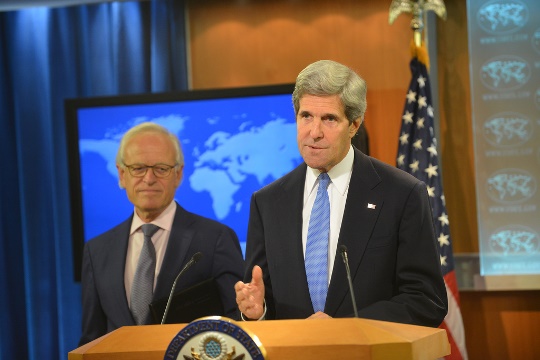More and more reports are suggesting that the U.S. is planning to put forward an offer that would end the impasse in Israeli-Palestinian peace talks.

Martin Indyk, the American envoy for Israeli-Palestinian peace talks, gave an hour-long address at the end of the J Street Conference in Washington last month. Indyk said nothing about the talks themselves but some commentators noticed a couple of references to them: first, the American envoy said the talks’ goal was to reach a final status agreement and nothing else; second, that by next year’s conference, he said, “the leaders will have had to make their choice.”
Since most people estimated – and still do – that the talks themselves will go nowhere, the last statement was seen as indication that somewhere along the way the American administration would put forward a proposal of its own – a bridging idea or agreement that the two parties will have to accept or reject (no need to hold your breath, I explain what I believe their response will be by the end of this post).
In the month since Indyk’s speech, speculation about an American-led initiative has become more frequent and explicit. A two-page feature in Yedioth Ahronoth this weekend claimed that the United States has already given up all hope that the parties can reach an agreement on their own. According to the article, an American offer will be put forward before the end of the nine-month designated negotiation period.
The Yedioth report was light on specifics but it did claim that the American proposal will be made of an interim agreement and a certain framework or illustration of a final status agreement. It wasn’t noted if the interim agreement will include evacuating settlements (my hunch: a handful at best, but more likely none), or whether the Palestinian Authority would be upgraded to a recognized state (more probable, since there is no political cost attached to such a move). According to the report, some parts of — Oslo-designated and defined — ‘Area C’ in the West Bank will be moved under Palestinian “control.” I write control in quotes because the Palestinian Authority is not a real sovereign, but rather an extension of Israeli sovereignty.
Today, Zehava Gal-On of Meretz said that the U.S. administration is due to lay out an offer for the negotiating parties in January; Netanyahu didn’t rule out the possibility when asked about it in a cabinet meeting. Gal-On gave a slightly different view of the American offer, estimating that it will be based on the pre-1967 borders with agreed-upon land swaps. However, Netanyahu has in the past rejected this idea — and also in public. Netanayhu also recently spoke out against a territorial compromise over Jerusalem, which is also the position of his main coalition partners, Naftali Bennett and Yair Lapid.
Ma’ariv and Army Radio also reported on a possible U.S. offer.
I see no reason to doubt the reports. It’s no secret that no progress was made in the talks. The Palestinian negotiating team even threatened to resign this week following Israel’s decision to advance construction of 5,000 (!) housing units beyond the Green Line. Aside from admitting failure and leaving, the only card the State Department has left is a third-party proposal.
One of the lessons the Americans drew from the failed Camp David summit in 2000 was that President Clinton should have put forward his proposal earlier, hence the tendency by Oslo process veterans to try and do things differently this time. One could add to that the Israeli peace camp’s almost messianic view that only the U.S. can impose a deal that would establish a sort-of Palestinian state and end the occupation. I am sure American diplomats have heard again and again from many peace industry leftists that the sooner they put something on the table, the better.
The administration, however, can only blame itself for the impasse in the talks. For almost five years Benjamin Netanyahu refused to enter direct negotiations under the terms of reference agreed upon in previous rounds of talks. These terms were by no means favorable to the Palestinians – they included the annexation of settlements blocs to Israel and only a symbolic right of return for Palestinian refugees – but Netanyahu rejected them anyway. After two years the Obama administration gave up hope that it might change Netanyahu’s mind. After another three years, it forced the Palestinians to enter negotiations based on nothing; talks for the sake of talks. As long as America continues to decide to avoid any serious confrontation with Jerusalem at all costs, it will be impossible for the U.S. to impose a deal – unless it is imposed on the Palestinians, of course.
It is less likely then that the U.S. will base its new proposal on an immediate implementation of the Clinton parameters, which include dividing Jerusalem and are based on pre-1967 borders (and therefore ensure another showdown with Netanyahu). Yedioth’s version, according to which the first stage will include a transfer of mostly empty land to the PA and certain symbolic benefits – along with the usual monetary bribes – seems to me more likely. The final status agreement will be outlined but postponed to some future point with the specifics negotiated along the way. If that sounds like an Oslo redux, it’s not a coincidence.
Israel will be happy with an interim deal and would like to reject implementing a final status agreement for the foreseeable future. For the Palestinians it will be a disaster but they can’t afford to say no and once again be accused of missing an opportunity for peace and freedom; the entire statehood project would collapse if they do. So both parties will answer “Yes, but.”
Peace will be celebrated. The occupation will continue.
Related:
Don’t cheer these peace talks
Jordan Valley fence would finalize the West Bank’s complete enclosure
The Israeli negotiator who thinks the two-state solution is still possible

